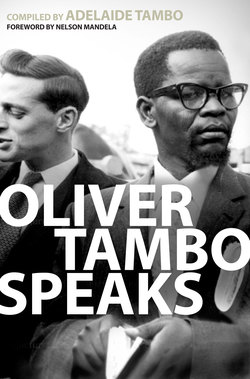Читать книгу Oliver Tambo Speaks - Oliver Tambo - Страница 12
На сайте Литреса книга снята с продажи.
Introduction
ОглавлениеWhen Tambo went into exile in 1960, the process of decolonisation had only recently begun in Africa. Newly independent African states condemned apartheid and began an international drive towards isolating South Africa diplomatically and economically. Resentment against white colonialism was fuelled when on 5 October 1960 white South Africans voted, by the narrowest of margins, to become a Republic, duly declared on 31 May 1961. In March of that year South Africa was forced out of the Commonwealth. The white minority regime withdrew into a laager, protected to the north by a cordon of states in which white supremacy held sway. Its other neighbours, Lesotho, Botswana and Swaziland, were nominally independent but actually dominated by South Africa because of migrant labour and economic dependence.
Reacting to the banning of the ANC, the wholesale arrests of leaders and activists, and the clamp down on all public protest, the ANC resolved that the non-violent path could not be sustained. It created a military wing to prepare for a new mode of struggle initially based on sabotage. On 16 December 1961 Umkhonto we Sizwe, with Mandela as Commander-in-Chief, announced its existence with a manifesto and attacks on government buildings in Johannesburg, Port Elizabeth and Durban. Umkhonto disavowed all types of terrorism and stated that its targets were installations not persons. There followed a year and a half of underground organisation and actions, until in July 1963 most of the top Umkhonto leaders were arrested at Rivonia, near Johannesburg, and sentenced to life imprisonment.
With the gathering storm of state oppression inside South Africa, it was Tambo’s initial task to establish a foreign mission. He devoted himself to fundraising and diplomatic representations in world forums. In June 1960 Tambo was instrumental in establishing a South African United Front with the SAIC, the PAC and SWANU. It lasted until early 1962 when it broke up as a result of PAC hostility to co-operation with the ANC.
By this time the sabotage campaign had begun inside South Africa, while the external mission arranged training facilities and funds for Umkhonto recruits. After the Pan-African Freedom Movement for East, Central and Southern Africa meeting in Addis Ababa in February 1962 – to which Mandela made a surprise visit – funds were promised by a number of countries and training facilities made available in Algeria.
Over the following two decades substantial military assistance came from the socialist countries of Europe, from Cuba and from several African countries. Close links were established with the Conferência das Organizações Naçionalistas das Colónias Portuguesas, an alliance of Frelimo, MPLA and the Guinean PAIGC.
Over the same period representations were made to the United Nations on the evils of apartheid. Tambo appeared as petitioner before the Special Political Committee and in 1963 tangible diplomatic success was achieved when the United Nations Security Council appointed a group to examine the crisis in South Africa. In June 1964 the Security Council passed a resolution condemning the conduct of the Rivonia Trial two days before sentence was handed down. Soon after, a Special Committee Against Apartheid was set up and from early 1967 was serviced by its own Unit on Apartheid within the Section for African Questions in the Security Council. However, the South African government retained formal representation at the United Nations.
Between 1963 and 1965 thousands of suspected ANC members were arrested in the Eastern Cape, Transvaal and Natal, severely damaging the internal movement. In early 1963 Tambo was joined in the external mission by Moses Kotane, Treasurer-General of the ANC and General Secretary of the South African Communist Party, Duma Nokwe, the ANC Secretary-General, and J B Marks, a veteran of the ANC and trade union movement. From this point on the most important Congress Alliance leaders were either in gaol or in exile and the internal movement severely battered.
In 1963 the Organisation of African Unity (OAU) was established and the Pan-African Freedom Movement was incorporated as the African Liberation Committee, presided over by the Tanzanian Foreign Minister, Oscar Kambona. Tanzania now became the most important supporter of the ANC and Dar es Salaam the centre of its external organisation. Over the next few years four guerrilla training camps were set up and at one of them, Morogoro, the ANC headquarters were based. It was from these bases that Umkhonto recruits were later moved to Zambia. Early in 1967 they undertook their first joint military campaign into Rhodesia and continued to infiltrate thereafter. In the same year Chief Luthuli died and Tambo became Acting President-General.
